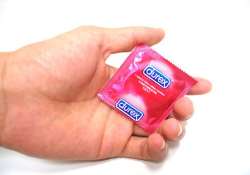Female condom yet to gain acceptability in India
Thiruvananthapuram, Sep 11: The female condom has not gained the kind of social acceptability in India it should have been six years after its launch but efforts are underway to reverse the trend, its manufacturer

Thiruvananthapuram, Sep 11: The female condom has not gained the kind of social acceptability in India it should have been six years after its launch but efforts are underway to reverse the trend, its manufacturer says.
But HLL Lifecare, which manufactures the condom with the support of Britain's Female Health Company (FHC), appears to be taking things on its stride as the male condom also took a long time to gain popularity.
On the eve of World Female Condom day Wednesday, HLL Lifecare Chairman and Managing Director M. Ayyappan said the company would redouble efforts to sensitise people, holding seminars, road shows and opening of special stalls.
"Now our job is to hold awareness campaigns that will highlight this product. We are basically looking to empower women because they have to take the lead. And we will do it," Ayyappan told IANS.
In the last fiscal, 36,000 female condoms was sold in the open market in the country.
"Velvet", produced at HLL's Kochi plant, is the only female condom that is approved by the World Health Organisation, presently being sold in the country.
The product has a shelf life of five years.
Currently the ring and the sheath come from FHC and the assembly line of the final product takes place at the Kochi plant of the Thiruvananthapuram-based mini-ratna company.
Today, this unique protective sex product is sold through two channels, the open market and through The National AIDS Control Organisation (NACO), which markets this through campaign programmes across the country.
HLL produced 3.2 lakh female condoms in the last fiscal of which NACO procured 2.80 lakhs. In the fiscal 2010-11, open market sales was 25,000 pieces while NACO bought around eight lakh pieces.
Today a packet of Velvet that contains three pieces costs Rs.100 in the open market and HLL gets Rs.24 per piece for its supplies to NACO.
HLL is doing all what they can through a trust promoted by them which distributes this product through NGO's and commercial sex workers across the country.
The Trust has been working with around 270 NGO's in Andhra Pradesh, Tamil Nadu, Maharashtra and Karnataka and has supplied close to three lakh pieces.
But HLL Lifecare, which manufactures the condom with the support of Britain's Female Health Company (FHC), appears to be taking things on its stride as the male condom also took a long time to gain popularity.
On the eve of World Female Condom day Wednesday, HLL Lifecare Chairman and Managing Director M. Ayyappan said the company would redouble efforts to sensitise people, holding seminars, road shows and opening of special stalls.
"Now our job is to hold awareness campaigns that will highlight this product. We are basically looking to empower women because they have to take the lead. And we will do it," Ayyappan told IANS.
In the last fiscal, 36,000 female condoms was sold in the open market in the country.
"Velvet", produced at HLL's Kochi plant, is the only female condom that is approved by the World Health Organisation, presently being sold in the country.
The product has a shelf life of five years.
Currently the ring and the sheath come from FHC and the assembly line of the final product takes place at the Kochi plant of the Thiruvananthapuram-based mini-ratna company.
Today, this unique protective sex product is sold through two channels, the open market and through The National AIDS Control Organisation (NACO), which markets this through campaign programmes across the country.
HLL produced 3.2 lakh female condoms in the last fiscal of which NACO procured 2.80 lakhs. In the fiscal 2010-11, open market sales was 25,000 pieces while NACO bought around eight lakh pieces.
Today a packet of Velvet that contains three pieces costs Rs.100 in the open market and HLL gets Rs.24 per piece for its supplies to NACO.
HLL is doing all what they can through a trust promoted by them which distributes this product through NGO's and commercial sex workers across the country.
The Trust has been working with around 270 NGO's in Andhra Pradesh, Tamil Nadu, Maharashtra and Karnataka and has supplied close to three lakh pieces.